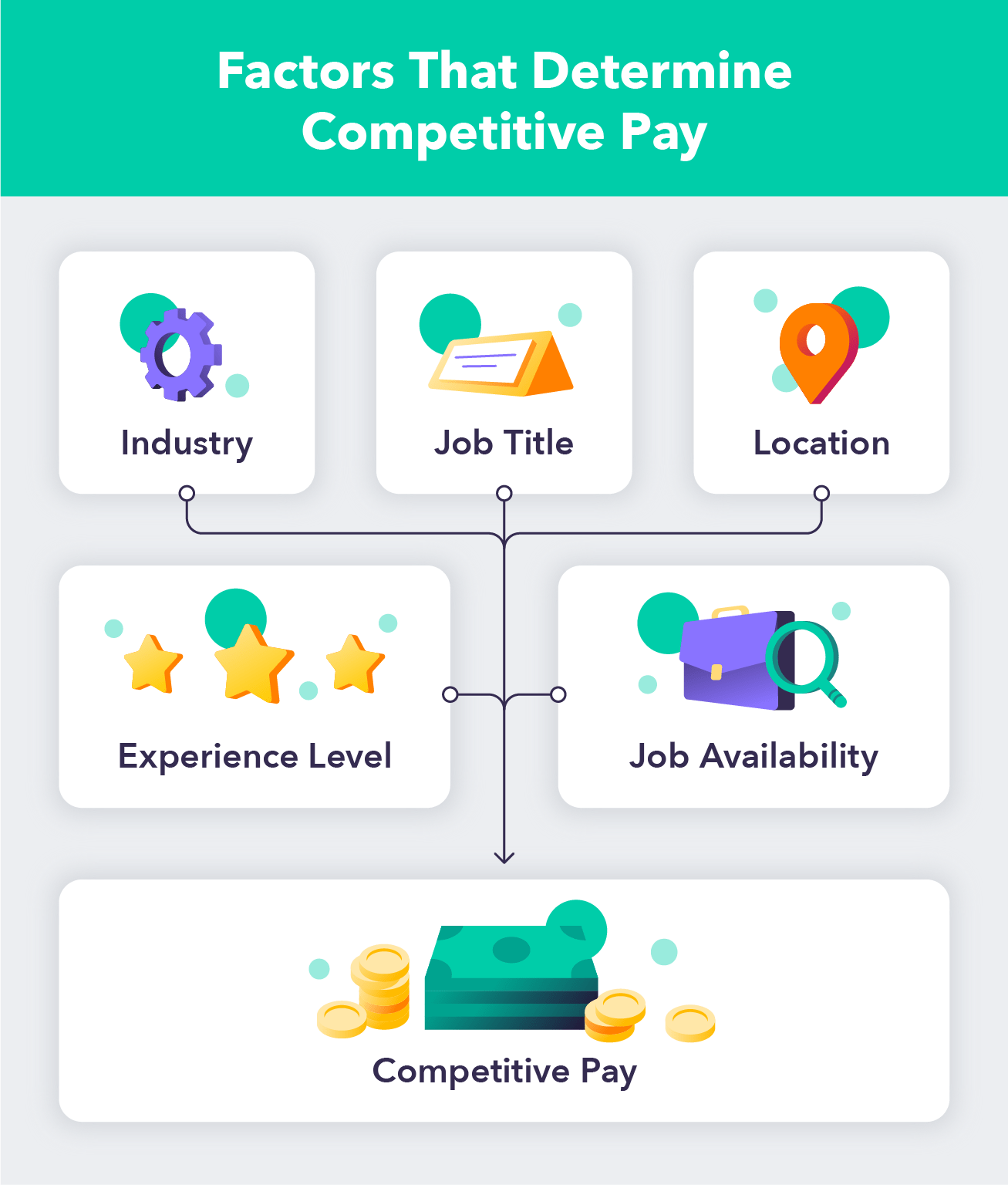Understanding Competitive Pay: In today's job market, the term “competitive pay” frequently appears in job listings, designed to attract talented individuals seeking to enhance their earnings. However, the term can be vague, leaving many to wonder what it truly entails. This article aims to clarify the concept of competitive pay, outline the components typically found in a comprehensive compensation package, and provide actionable strategies for securing better pay in your career.
Defining Competitive Pay and Its Importance
The term “competitive pay” refers to compensation that is on par with, or exceeds, the prevailing market rates for similar positions. Companies often set salaries based on the average salary for the role in question, sometimes adding a percentage to remain attractive to potential employees. The specific percentage can vary widely based on the organization’s compensation philosophy and the competitive landscape within the industry. Therefore, understanding what constitutes competitive compensation is crucial for job seekers, as it helps them gauge their worth relative to the industry standard and other organizations within the same geographical area.
Key Factors Influencing Competitive Pay
Several critical factors influence the level of pay you can expect, shaped by the specific circumstances of your job, including the industry, location, and demand for your skill set. It’s vital to recognize that compensation can fluctuate based on various elements, including the stability of the job market and the economic climate. Below is a detailed overview of five primary factors that significantly affect compensation levels in the workforce.
1. Job Title and Its Market Value
Job titles play a pivotal role in determining salary ranges, as different roles come with varying market values. It’s essential to conduct thorough research using reputable sources, such as the Bureau of Labor Statistics (BLS), to understand the average compensation for your specific job title. By knowing the market rate, you can better assess whether your current salary aligns with industry standards. Understanding compensation ranges for different titles can empower you during salary negotiations, ensuring that you advocate for fair pay based on your professional designation.
2. The Impact of Experience Level on Salary
Experience level is another significant determinant of salary; typically, employers adjust pay according to the applicant's relevant experience. Whether you are looking for entry-level positions, mid-tier roles, or senior positions, the level of expertise required can greatly influence the salary offered. Entry-level positions often come with lower compensation due to the lack of required experience, while mid-tier and senior roles generally offer higher pay reflecting the years of experience and specialized skills. Therefore, it’s crucial to consider not only your qualifications but also the demand for your skill set when evaluating potential compensation.
3. Industry-Specific Salary Norms
The industry in which you work has a profound effect on your salary expectations. Certain sectors, particularly those experiencing rapid growth, such as technology and finance, tend to offer more competitive salaries to attract skilled professionals. If you have a specific career path in mind but are flexible regarding the industry, exploring various sectors can reveal discrepancies in compensation packages. By investigating industry averages, you can identify the sectors that offer the highest compensation and strategically apply to organizations that align with your financial goals.
4. Geographic Location and Its Influence on Pay
Geographic location plays a crucial role in determining salary, as job markets often reflect the cost of living in specific areas. Regions with a higher cost of living typically offer elevated salaries to accommodate the increased expenses faced by employees. When researching salary information, it’s beneficial to focus on specific locations or cities due to the significant variations in pay even within the same industry. Resources like the BLS provide wage data that can help you understand regional differences and guide your salary expectations based on the local market.
5. The Role of Job Availability in Salary Trends
The availability of jobs in a given field can significantly impact pay levels. In high-demand roles where there is a shortage of qualified candidates, salaries tend to be more competitive. Conversely, if there is an oversupply of candidates for a specific position, salaries may decrease as employers have more options to choose from. To maximize your earning potential, it’s wise to research which jobs are currently in demand and target those positions, as they often come with better compensation packages.
Exploring the Components of a Competitive Pay Package
Competitive pay encompasses more than just the base salary; it includes a comprehensive compensation package that can significantly enhance your overall earnings. When evaluating a job offer, it’s vital to consider additional benefits that may be included, such as paid time off, health insurance, retirement plans, and various bonuses.
Understanding Paid Time Off Benefits
Paid time off (PTO) is a crucial element of any compensation package, directly impacting your work-life balance and overall job satisfaction. Employers typically offer a set amount of PTO that employees can utilize for personal time, sick leave, or vacations. Taking regular breaks from work is essential for maintaining mental and physical health, which in turn boosts productivity and job performance. Prioritizing a healthy work-life balance allows you to set boundaries, prevent burnout, and achieve both personal and professional goals. Therefore, understanding the PTO policy is essential when considering a job offer.
The Importance of Health Insurance in Compensation
Health insurance has become a standard component of employment compensation packages, providing critical coverage for medical expenses. The type of health insurance offered can vary significantly depending on whether the position is full-time or part-time. Comprehensive health benefits, including medical, dental, and vision coverage, are highly sought after in today's job market. Employees increasingly value high-quality health plans, making it an essential factor in evaluating job offers. As healthcare costs continue to rise, the value of robust health insurance cannot be understated.
Retirement Savings Options as Part of Your Compensation
Many employers include retirement savings plans within their compensation packages, allowing employees to save for their future. Options like 401(k), 403(b), or Roth IRA plans enable employees to contribute a portion of their salary towards retirement savings, often with employer matching contributions. This feature not only helps secure financial stability in retirement but also incentivizes employees to maximize their contributions. It’s advisable to understand the retirement options available, as they can significantly impact your long-term financial health.
Inquiring About Additional Employee Benefits
While salary, PTO, health insurance, and retirement plans form the core of a compensation package, there are often other valuable benefits available that should not be overlooked. During salary negotiations, it’s wise to inquire about additional perks such as performance bonuses, stock options, or profit-sharing plans. Below are some essential items to consider discussing during compensation negotiations:
- Signing bonus
- Performance bonus
- Relocation bonus
- Stock options
- Profit-sharing plan
- Supplemental budget (e.g., for wellness or career development)
Effective Strategies for Negotiating Competitive Pay
When a job listing indicates that competitive pay is available, it signals that the company is open to negotiating salary and benefits. As you prepare for an application or interview, remember that compensation is influenced by various factors, many of which are personal to you as a candidate. To effectively leverage this knowledge, follow these three essential steps to negotiate for the salary you deserve.
1. Identify Your Key Compensation Priorities
Understanding your priorities in terms of compensation is critical when entering salary negotiations. While salary is often the focal point of discussions, there may be limitations based on company budgets or salary structures. Before negotiations, determine which aspects of compensation matter most to you. If a higher salary isn't feasible, consider alternative forms of compensation, such as bonuses or stock options, that might align better with your financial goals and needs.
2. Support Your Salary Request with Research
While it’s one thing to request a higher salary or better benefits, backing your request with solid evidence is essential for successful negotiations. Use data from credible sources to present a compelling case for why you deserve more. Compare your current compensation with market rates for similar positions in your industry and region. By demonstrating how your qualifications and experience can add value to the organization, you can strengthen your argument for a higher salary or better benefits.
3. Maintain Professionalism While Advocating for Yourself
During salary negotiations, it’s important to maintain a professional demeanor while confidently standing your ground. HR representatives are often prepared to negotiate, and they may initially present a budgeted offer. If you believe your skills justify a higher salary, politely express your request for reconsideration. Use phrases like:
“I understand that the position has a budgeted amount, but based on the value I bring to the team, I would like to explore the possibility of a higher compensation of [desired amount].”
This approach shows that you value the opportunity while also asserting your worth. Maintaining professionalism and clear communication will help ensure you don’t miss out on valuable opportunities for salary increases or career advancement.
In conclusion, understanding the nuances of competitive pay is essential for anyone navigating the job market. When you encounter this term during your job search, approach it with enthusiasm and confidence. Remember that competitive pay is influenced by market rates and your unique qualifications, so tailor your expectations accordingly.
Even if your research doesn’t yield your ideal salary, believe in your skills and use these strategies to negotiate the most competitive compensation package possible. Whether you secure a signing bonus, additional vacation days, or that coveted higher salary, your efforts will have a positive impact on your financial well-being.
Sources: American Marketing Association | Digital HR Technology |
The post Competitive Pay: What It Means and How To Get It appeared first on MintLife Blog.
The Article Competitive Pay: What It Means and How To Receive It First Appeared ON
: https://gqcentral.co.uk

















Guillaume Hunter
You’ve really highlighted an essential topic that many of us grapple with in today’s job market. I’ve often found that the concept of competitive pay doesn’t just hinge on salary but also on the overall benefits package, like health insurance, retirement plans, and even professional development opportunities. This holistic view can sometimes make a lower base salary more appealing.